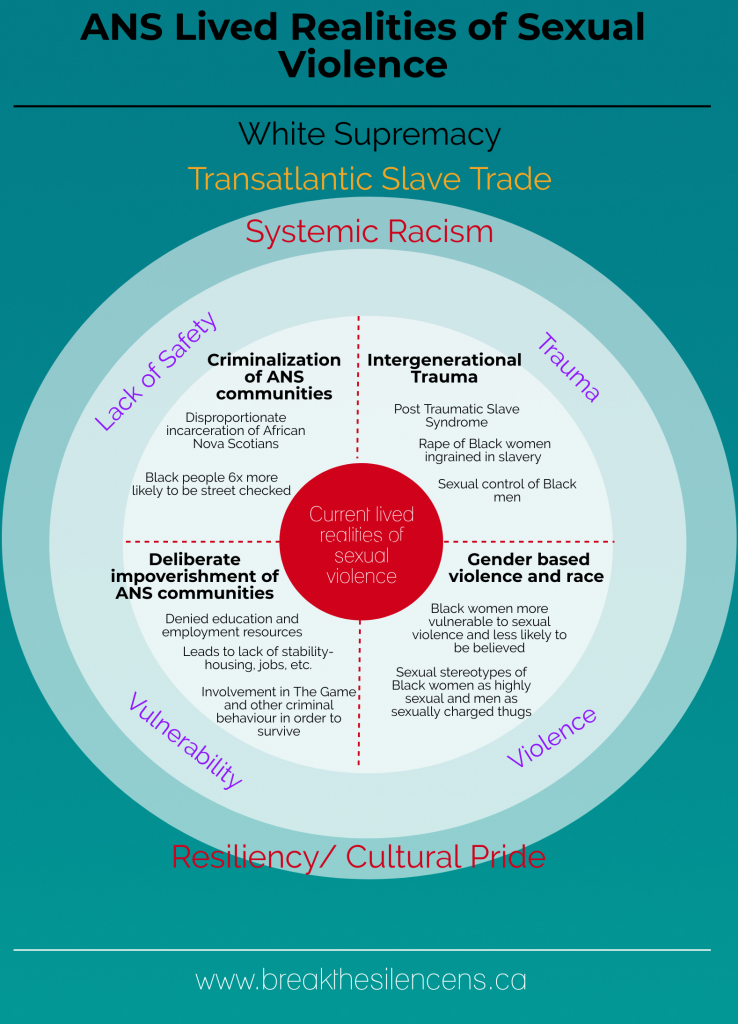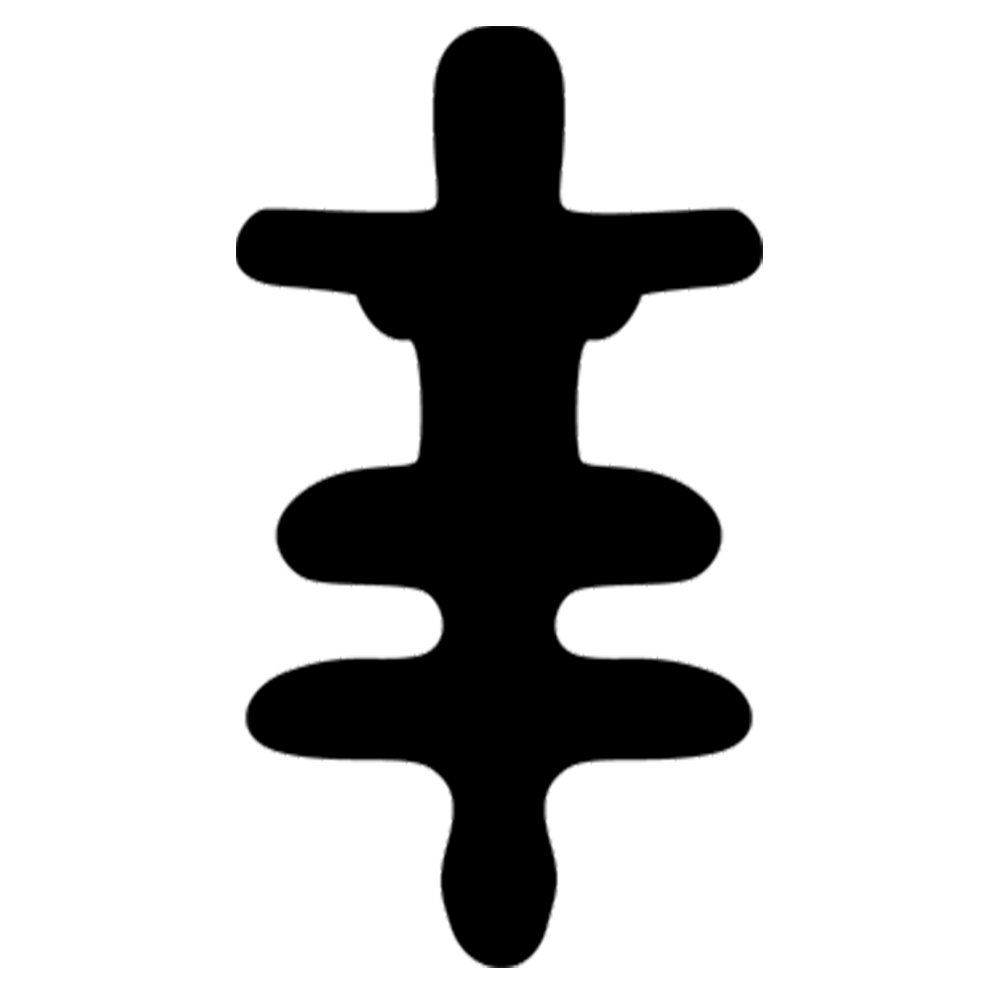Current Lived Realities of Sexual Violence


Introduction
It is impossible to separate the current lived realities of sexual violence of African Nova Scotians from the legacy of the Transatlantic Slave Trade and ongoing systemic racism.
Gender-based violence and race are connected. Disproportionately, African Nova Scotian girls and women are trafficked and sexually exploited, and African Nova Scotian boys and men are criminalized and incarcerated. ANS communities have been deliberately impoverished, denied housing, had their children taken into care and been denied equal employment opportunities. These conditions lead to increased vulnerability to sexual violence.
Despite these harsh realities, African Nova Scotians are resilient in the face of ongoing systemic racism. Cultural pride is a major source of strength for African Nova Scotian communities.
-

"the talons of the eagle"
symbol of strength, bravery, power
The eagle is the mightiest bird in the sky, and its strength is concentrated in its talons. The Oyoko clan, one of the nine Akan clans, uses this symbol as their clan emblem.

White Supremacy
White supremacy is the racist belief that white people are superior to those of all other races, and should therefore dominate society. White supremacy is not always overt. It can be subtle and is embedded in everyday interactions. White supremacy perpetuates stereotypes of Black men being violent and dangerous, and of Black women as exotic sexual objects. These harmful stereotypes contribute to high numbers of incarcerated Black people and the pervasive violence against Black women and girls.
“White identity has mutated and evolved over the years, but its core belief in being better, of being above others is deeply intact. When white people complain that Mexicans are taking their jobs; when white people complain that Asian Americans are taking over their country; when white people complain that Blacks are ruining their neighborhood — this concept of ownership, of entitlement, is all based on the notion that this is a white society that is supposed to benefit white people.”
Chris Crass, White Supremacy On My Mind: Learning To Undermine Racism

Intergenerational Trauma and Transatlantic Slave Trade
Trauma and its effects can be passed on from one generation to the next, especially when people see and hear about generations of sexual violence within and against members of their community. The rape of Black women and the castration and sexual control of Black men during enslavement has led to intergenerational trauma and destructive racial sexual stereotypes.

Systemic Racism
Canada's history of enslavement, racial segregation, and oppression of African Canadians has left a legacy of systemic racism in Nova Scotia. Systemic racism leads to the conditions that impose poverty, lack of education, child welfare involvement, criminalization and incarceration, all of which make African Nova Scotians more vulnerable to sexual violence.
“Systemic racism results in assumptions around the evil Black man trafficking innocent white girls. There are many instances of white men trafficking innocent Black girls. That is not in the public imagination. People don’t care that the victims of violence might be Black women. It doesn’t matter. We’re not considered innocent in the same way.”
El Jones, Poet, Professor, Activist

Gender Based Violence and Race
Women
For women of African descent, a frequent stereotype is the “Jezebel”: a highly sexual woman, erotic and exotic. This stereotype supported, enabled, and justified the routine sexual abuse of enslaved Black women.
The persistence of this stereotype makes women of African descent more vulnerable to sexual violence and less likely to be believed when they report it. Girls and women of African descent are hypersexualized and objectified in the media and when cases of sexual violence are covered, the victims/survivors are blamed and portrayed as complicit.
A recent study shows that adults perceive Black girls as “less innocent and more adult-like than their white peers, especially in the age range of 5–14.” (Georgetown Law Center on Poverty and Inequality). This perception has deeply negative consequences for Black girls, including that it may further increase their risk of being sexually victimized.
Another stereotype is the Strong Black Woman. This is the expectation that a Black woman will not show any signs of weakness or suffering. She will shrug off all negativity like it never happened and carry on: deflect all racialized oppression, take care of others to the detriment of her own health and wellbeing, and place the care of others ahead of her own needs.
Women of African descent often internalize violence and turn to self-harm as a way to cope. Being exposed to sexual violence on a regular basis can desensitize someone to this kind of harm, leading to self-blame. Although there are positive shifts taking place, especially on social media, (#metoo, #BeenRapedNeverReported, #SurvivingRKelly), systemic racism, misogyny, the code of silence, and intergenerational trauma continue to normalize sexual violence against Black women.
Men
There are disturbing trends in pop culture about what it means to be a man of African descent. Stereotypes of men and boys of African descent are often negative, depicting them as aggressive, hypersexual, violent, and criminal. This creates a perception of someone who is less than human, a perpetrator of violence incapable of being sexually victimized. Since slavery, men of African descent have been portrayed as needing to be policed and controlled.
These stereotypes:
- can hinder ANS men’s ability to cultivate healthy self-perceptions
- make it harder for ANS men to talk freely about the real issues Black men are dealing with
- can silence ANS men who have been subjected to sexual violence and cause them to not seek support and healing
- limit models of healthy masculinity for ANS boys
Toxic masculinity encourages men to externalize their pain and anger, leading to the use of violence to solve problems.
Issues of Sexuality and Gender Diversity
Not addressing transphobia and homophobia contributes to the invisibility of 2SLGBTQ+ African Nova Scotians. There is a distinct lack of representation of 2SLGBTQ+ individuals in the African Nova Scotian community.
“The homophobic ethic that pervades the Black community seems to be rooted first in the church. The church has not been a friendly, welcoming place for 2SLGBTQ+ African Nova Scotians. At the same time, ANS have a history of being loving and accepting of everyone in the community.”
Robert Wright
“When you’re in the ANS community you don’t want to sacrifice yourself by coming out or being too loud about your sexual orientation or gender. In the LGBTQIA2S + community in Nova Scotia there is still a lot of racism. For example, a lot of the entertainment in the queer community is based around impersonating or appropriating Black Culture and Black females specifically in the drag community.”
Kate Macdonald
Deliberate Impoverishment of ANS communities
ANS communities have been deliberately impoverished, denied housing, and denied equal employment opportunities. This leads to increased vulnerability to sexual violence. Living in poverty can increase dependency on other people, which may mean moving in and out of housing situations that are unsafe. Economic instability causes people to “do what they have to do” to survive. For some, this can mean engaging in illegal and dangerous ways of making money. Criminalized individuals are highly vulnerable to sexual violence.
Lack of opportunities

The Game
The Game is a slang term used for involvement in street life and as an illegal means to earn money which includes but is not limited to the selling of sex, drugs and/or guns. Referring to it as ‘The Game’ gives the illusion that it can be a fun and easy way to make money, when the reality is much harsher.
The Game
The Game: Safety/Protection/Status
The Game: Desensitized and normalized

Lack of Safety/ Criminalization of ANS Communities
It can be difficult for African Nova Scotians to speak out about issues in our communities because of the very real threat of violence and injustice. Going to the police is not always safe. Systemic discrimination within the criminal justice system and a history of police violence makes members of the ANS community hesitant to report to police. Systemic racism has contributed to the code of silence within ANS Communities.
There are many reasons why people choose not to report to police. African Nova Scotian women are often not believed or respected when seeking help after being subjected to sexual violence. ANS women are often re-victimized, especially if there is any history of criminalization. The code of silence is another reason why ANS women may not report sexual violence. This is especially the case when harm is caused by ANS men because there is a fear of further stigmatizing the Black community.

Disproportionate Incarceration
Black people are over-policed, under-protected, and disproportionately incarcerated. This means that Black people are increasingly put at risk in environments where sexual victimization occurs, and patterns of abuse are reproduced.
“There is increased incidence of sexual violence in spaces of control, so whether that's being incarcerated or even being under the control of an individual whether you're on probation or parole or in care. And yet we don't talk about that. We don't screen for sexual victimization or sexual trauma among people who've been incarcerated.”
Robert Wright, Social Worker
“Women are incarcerated because they are victimized by sexual violence. Sexual violence is not A but THE contributing factor to incarcerations, in particular incest and childhood molestation. There is an overwhelming correlation between that. So we’re essentially incarcerating women as a result of sexual and physical violence, and prison doesn’t do anything for them.”
El Jones, Poet, Professor, Activist

Resilience/Cultural Pride
Music and spirituality play important roles in the lives of Black people in Nova Scotia, historically and today. They are sources of strength, tools of resistance, coping strategies, and buffer people against the everyday realities of racism to help promote health, well-being, and cultural pride. Community gatherings are sites of celebration, joy, and connection. And, community protest is a strategy to voice dissent, demand change, and to be proud.

Reflection Activity:
- What new insights have you learned?
- What are you surprised by?
- What feels most challenging to you?
- What would you like to further explore?


